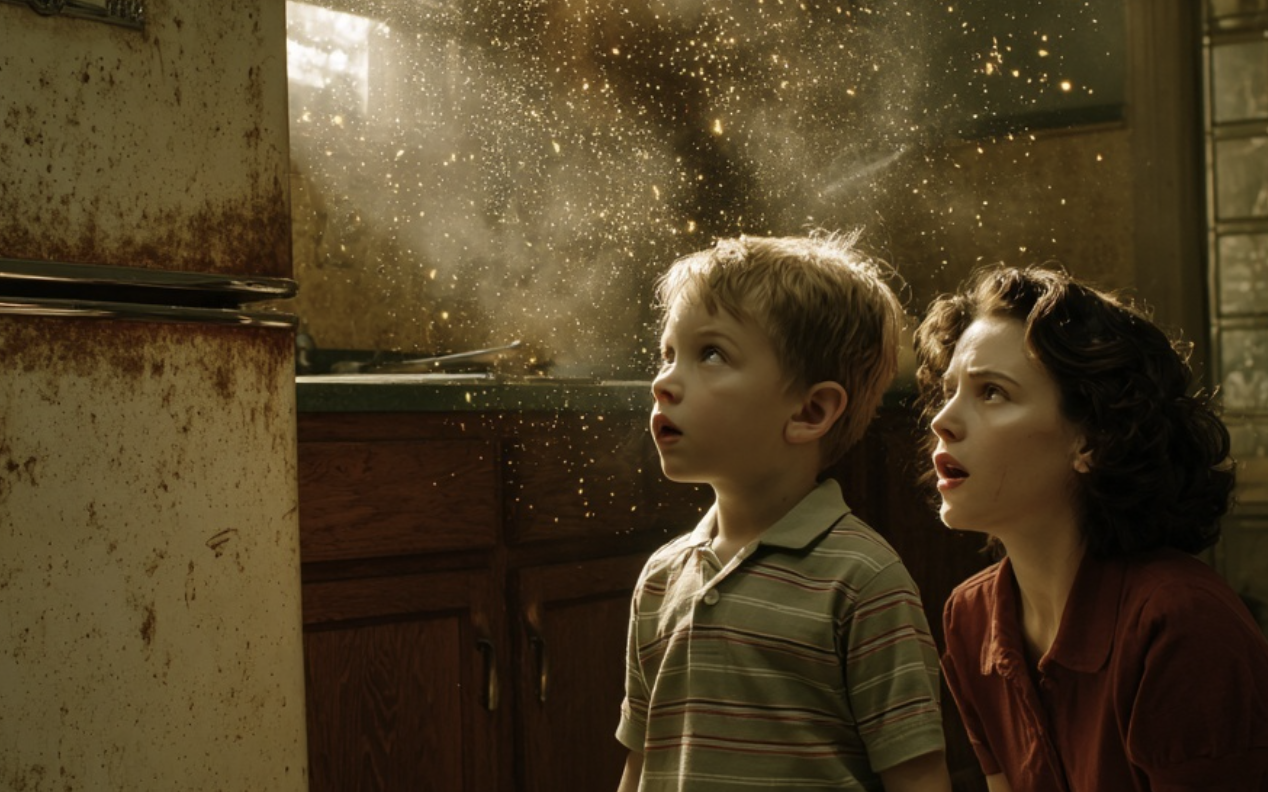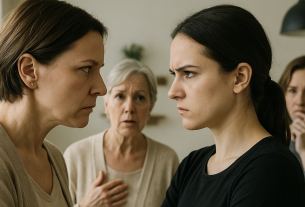A heavy, suffocating silence wrapped around the apartment, steeped in the scent of incense and wilting lilies. Marina sat hunched on the edge of the couch, as if crushed by an invisible weight. The black dress clung to her body, itching—reminding her of the cause of this dead stillness: today she had buried her grandmother, Eiroïda Anatolyevna—the last family she had left in the world.
Across from her, sprawled in an armchair, was her husband Andrey. His presence felt like mockery—for tomorrow they were to file for divorce. He had not spoken a single word of sympathy, only watching her in silence, barely concealing his irritation, as though impatient for this tedious play to end.
Marina fixed her gaze on the faded carpet pattern, feeling the last sparks of hope for reconciliation slowly extinguish, leaving only an icy void behind.
“Well then, my condolences,” Andrey finally broke the silence, his tone dripping with sarcasm. “Now you’re quite the lady of means. An heiress! I suppose your granny left you a fortune? Oh, right, I forgot—the greatest inheritance of all: an old, stinking ZiL fridge. Congratulations, what a luxury.”
His words cut sharper than any blade. Memories rose: endless quarrels, shouting, tears. Her grandmother, with the rare name Eiroïda, had hated her son-in-law from the start. “He’s a swindler, Marina,” she would warn sternly. “Empty as a barrel. Watch out—he’ll strip you bare and leave you.” Andrey would only curl his lip and sneer, calling her “the old witch.” Marina had stood between them countless times, desperately trying to smooth things over, shedding tears in the belief she could mend it all. Now she understood: her grandmother had seen the truth from the very beginning.
“And speaking of your ‘brilliant’ future,” Andrey continued cruelly, adjusting his expensive jacket, “don’t bother coming to work tomorrow. You’re fired. The order was signed this morning. So, darling, soon even your ZiL will feel like a luxury. You’ll be scavenging scraps from dumpsters, and you’ll thank me for it.”
That was the end. Not just of their marriage—the end of the entire life she had built around this man. The last hope that he might show a shred of humanity was gone. In its place, cold, pure hatred began to take root.
Marina lifted her empty eyes to him but said nothing. What was the point? Everything had been said already. Silently, she rose, walked into the bedroom, and picked up the bag she had packed in advance. Ignoring his jeers and laughter, she gripped the key to her grandmother’s old, long-abandoned apartment and walked out without a backward glance.
The street greeted her with a chill evening wind. She paused beneath a dim streetlamp, setting down two heavy bags. Before her loomed a gray nine-story building—the home of her childhood and youth, where her parents had once lived.
She hadn’t been here in years. After the car crash that killed her mother and father, her grandmother had sold her own apartment and moved here to raise her granddaughter. These walls held too much pain, and once Marina married Andrey, she avoided the place, meeting her grandmother anywhere but here.
Now it was her only refuge. Bitterness twisted in her chest as she remembered Eiroïda Anatolyevna—her support, her mother, father, and friend all in one. Yet in recent years Marina had visited so rarely, consumed by work at her husband’s firm and her futile attempts to save their crumbling marriage. Guilt pierced her heart. At last the tears she had held back all day burst forth. She stood trembling with soundless sobs, small and lost in the vast, indifferent city.
“Auntie, need help?” came a thin, hoarse voice nearby. Marina started. A boy of about ten stood before her, wearing a jacket far too big and worn sneakers. Dirt streaked his cheeks, but his gaze was clear, almost adult. He nodded toward her bags. “Heavy, huh?”
Marina hastily wiped her tears. His straightforwardness caught her off guard.
“No, I’ll manage…” she began, but her voice broke.
He studied her intently.
“Why are you crying?” he asked—not with childish curiosity but with a sober, adult tone. “Happy people don’t stand in the street with suitcases, crying.”
Those simple words made her see him differently. His eyes held no pity, no mockery—only understanding.
“My name’s Seryozha,” he said.
“Marina,” she exhaled, tension easing a little. “All right, Seryozha. Help me.”
She nodded at one of the bags. He grunted, lifted it, and together they entered the dark, damp stairwell smelling of mold and cats.
The apartment door creaked open, releasing silence and dust. White sheets covered the furniture, curtains drawn tight, with only faint streetlight catching the drifting motes. The air smelled of old books and sadness—an abandoned home. Seryozha set down the bag, glanced around like a seasoned cleaner, and pronounced:
“Yeah… this’ll take a week, at least, if we work together.”
Marina managed a weak smile. His practicality brought a spark of life into the gloom. She looked at him—thin, small, yet so serious. She knew that once he finished helping, he would return to the cold and danger of the streets.
“Listen, Seryozha,” she said firmly. “It’s late. Stay here tonight. It’s too cold outside.”
He looked up in surprise. For a moment his eyes flashed with doubt, but then he simply nodded.
That evening, after a modest meal of bread and cheese from the corner shop, they sat in the kitchen. Clean and warm, Seryozha looked almost like any ordinary child. He told his story—without self-pity or tears. His parents drank. A fire in their shack. They died. He survived. They sent him to an orphanage, but he escaped.
“I won’t go back,” he said, staring into his empty cup. “They say from the orphanage it’s straight to prison. Like a ticket to misery. Better the street—at least you fend for yourself.”
“That’s not true,” Marina said softly, her own grief fading before his. “Neither an orphanage nor the street decide who you become. Only you. It’s all up to you.”
He looked at her thoughtfully. And in that moment, a fragile but unbreakable thread of trust stretched between their two lonely souls.
Later, Marina made up a bed on the old couch, found clean linens scented with mothballs. Seryozha curled up and drifted off almost instantly—the first time in ages in a real, warm bed. Watching his peaceful face, Marina felt: maybe her life wasn’t over after all.
The next morning, gray light slipped through the curtains. Marina tiptoed to the kitchen, scribbled a note: “I’ll be back soon. There’s milk and bread in the fridge. Don’t go anywhere.” Then she left.
Today was divorce day.
The court hearing was even more humiliating than she had feared. Andrey showered her with insults, painting her as a lazy, ungrateful parasite. Marina kept silent, feeling hollow and filthy. When the session ended and she walked out with the divorce decree in hand, she felt no relief—only emptiness and bitterness.
As she wandered the city aimlessly, his jeering words about the fridge returned to her mind.
That clunky ZiL, dented and scratched, stood in the kitchen like a relic from another era. Marina regarded it with new eyes. Seryozha, too, came over, running his hands along its enamel, tapping thoughtfully.
“Whoa, that’s ancient!” he whistled. “Even the one in our shack was newer. Does it even work?”
“No,” Marina sighed, sinking onto a chair. “Silent for years. Just a keepsake.”
The next day they tackled a full cleaning spree. With rags, brushes, and buckets, they stripped peeling wallpaper, scrubbed grime, shook dust from old things. Conversation, laughter, pauses, then more work—hours passed, and to Marina’s surprise, each one made her feel lighter. The boy’s chatter and the physical labor washed the ashes of the past from her soul.
“When I grow up, I’ll be a train driver,” Seryozha declared dreamily, scrubbing a windowsill. “I’ll drive trains far, to places I’ve never been.”
“That’s a wonderful dream,” Marina smiled. “But to make it happen, you need to study well. That means going back to school.”
He nodded gravely. “If it’s necessary, I’ll do it.”
Yet his curiosity kept returning to the fridge. He circled it like a mystery, peered inside, tapped, listened. Something about the old ZiL unsettled him.
“Look, something’s off,” he finally said, calling Marina over. “Here, the wall’s thin, normal. But this side—it’s thick, solid. Doesn’t feel right.”
Marina ran her hand along it—indeed, one side felt denser. They inspected carefully and soon noticed a faint seam along the inner panel. With a knife, she pried it open, revealing a hidden cavity.
Inside lay neat bundles of dollars and euros. Beside them, in velvet cases, gleamed antique jewels: an emerald ring, a pearl necklace, diamond earrings. They froze, afraid to break the fragile silence of the miracle.
“Wow…” they breathed together.
Marina sank to the floor, everything clicking into place. Her grandmother’s words—“Don’t throw out old junk, Marina, it’s worth more than your flashy fop”—her insistence that Marina take this very fridge. Eiroïda Anatolyevna, who had lived through repression, war, and currency collapse, had trusted no banks. She hid everything—her past, her hope, her future—in what she thought the safest place: the wall of a refrigerator.
It wasn’t just treasure. It was a survival plan. Grandmother had known Andrey would leave Marina with nothing, and left her a chance—a chance to begin anew.
Tears poured again, but now of gratitude, relief, love. Marina turned to Seryozha, still spellbound by the find, and hugged him tight.
“Seryozha,” she whispered, her voice trembling. “Now everything will be fine. I can adopt you. We’ll buy a home, you’ll go to the best school. You’ll have everything you deserve.”
The boy turned slowly, his eyes filled with a deep, aching hope that made her heart ache.
“Really?” he asked softly. “You really want to be my mom?”
“Really,” she said firmly. “More than anything.”
Years flew like a breath. Marina officially adopted Sergei. With part of the treasure, they bought a bright, spacious apartment in a good neighborhood.
Sergei proved exceptionally gifted. He studied voraciously, caught up on lost years, skipped grades, and earned a scholarship to a prestigious economics university.
Marina too rebuilt her life: earning another degree, founding a small but thriving consulting agency. What once seemed destroyed regained shape, meaning, warmth.
Nearly ten years later, a tall, confident young man adjusted his tie in the mirror. Sergei, now grown, was graduating at the top of his class.
“Mama, how do I look?” he turned to Marina.
“As always—perfect,” she smiled proudly. “Just don’t get cocky.”
“I’m not cocky, I’m stating facts,” he winked. “By the way, Professor Lev called again. Why did you turn him down? He’s a good man. You like him.”
Lev Igorevich—their neighbor, a kind, intelligent professor—had long courted Marina shyly.
“Today something more important,” she waved him off. “My son is graduating. Let’s go, we’ll be late.”
The auditorium was packed—parents, professors, and company representatives scouting talent. Marina sat in the fifth row, her heart swelling with pride.
Then her gaze froze. Among the employers on stage, she recognized Andrey. Older, heavier, but the smug smirk was the same. Her heart skipped—then steadied. There was no fear, only a cold, clinical curiosity.
When Andrey took the podium as the head of a flourishing finance firm, he spoke pompously of careers, money, prestige.
“We seek only the best!” he declared. “We will open every door!”
Then the best graduate was called—Sergei. Calm and confident, he took the stage. The hall fell silent.
“Honored professors, friends, guests,” he began clearly. “Today we step into a new life. And I want to tell a story. About how I came to stand here. Once, I was a homeless boy on the street.”
A whisper rippled through the audience. Marina held her breath. She hadn’t known what he would say.
He continued, voice like steel. He told of a woman, cast out by her husband that very day—penniless, jobless, hopeless—who found him, dirty and starving. He spared no names, but his eyes stayed locked on a pale Andrey.
“That man told her she would scavenge in garbage,” Sergei said sharply. “In a sense, he was right. Because in the world’s garbage, she found me. And today, I want to thank him. Thank you, Mr. Andreyev, for your cruelty. Thank you for throwing your wife into the street. If not for you, my mother and I would never have met. And I would never have become who I am.”
The hall froze. Then erupted like an explosion. All eyes turned to Andrey, red with rage and shame.
“That is why,” Sergei concluded, “I state publicly: I will never work for a man of such morals. And I advise my peers to think carefully before tying their fate to his company. Thank you.”
He stepped down to thunderous applause—first hesitant, then roaring. Andrey’s reputation, built on showy wealth, collapsed in minutes. Sergei embraced Marina—teary, glowing with pride—and together they walked out, never looking back.
“Mama,” he said in the cloakroom, handing her coat. “Call Lev Igorevich.”
Marina looked at her son—grown, strong, kind. In his eyes shone love, gratitude, and confidence. For the first time in years, she felt truly happy.
She pulled out her phone and smiled:
“All right. I’ll say yes to dinner.”



